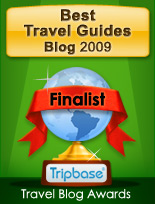 By Terry* and Lara
By Terry* and Lara
Sometimes when you visit a restaurant or stay at a hotel recommended by a guidebook, and it’s either nothing like you expected or you’re wondering what the fuss is about, don’t worry, the problem probably doesn’t lie with you. It’s quite likely the fault of a lazy reviewer. When we recently revisited an Italian city we’ve written extensively about, we dropped into a couple of bookshops to thumb through the latest guides to see what insightful new content had been created on the city. Our little test is to look for reviews of places we know intimately and see whether the writers know their stuff and/or whether we are simpatico with their thinking.
In this particular city (which shall remain nameless), we know one hotel extremely well, having had several lengthy stays there while researching the city. So we know about this certain hotel’s marketing gimmick and claims to being an “eco-friendly” hotel, which have little foundation. We mentioned this in our review of the property for a book on the city several years ago. Indeed, we wrote the review from our room there! But in an updated edition of that book, the new review by another author essentially reflects the hotel’s press release rather than the reality - that would have been revealed by a quick inspection and a couple of well-chosen questions. In the same guidebook, flicking through to the eating section, we noticed that a couple of well-known restaurants we were told we “had to” include in the book now get glowing reviews. One, we’d been able to convince the editor to leave out of our edition, as our meals had been ordinary and stupidly expensive. The other, we gave an average review; we had to include it because it had such a high profile. On both counts, we argued our case strongly. By doing so we felt we were doing the right thing by the readers.
This is how we approach our reviewing. If our readers are going to a destination and only have a couple of days to spend there, we obviously want them to have the best experience possible. If we’re going to send them to a so-called “eco-friendly” hotel that isn’t very eco-friendly at all, we’ll tell them why: because it’s a clean, decent-value hotel in an expensive city, despite its disingenuous eco-claims. If we think a restaurant doesn’t warrant inclusion, we’ll leave it out. And if we think another restaurant is very average but has to be included because of its high-profile chef and famous investors, we’ll reluctantly put it in, write a critical review, and leave it up to the reader to decide whether they want to spend their hard-earned cash there or go to another restaurant we wholeheartedly recommend instead. When writing reviews and labouring over these issues, we always ask ourselves: would we recommend the place to our friends? And would we be happy to go there with them?
The photo? It's the funky lobby of Qamardeen Hotel again, in Dubai. And no, they're not paying us, we just love this property and think it's one of Dubai's most stylish, best value, and yet, bafflingly, most underrated hotels.
* Terry is my co-author and husband, who occasionally blogs for Cool Travel Guide.
Tuesday, August 12, 2008
Brilliant minds think alike, or, Why so many guidebooks share the same listings: part 1
Posted by
Lara Dunston
at
2:44 PM
![]()
Labels: hotel reviews, hotels, travel media, travel writing
Subscribe to:
Post Comments (Atom)


























4 comments:
It's a good point you make in that if so many travel guide books list the same properties then it must tell us something. Enjoy reading your blog! Keep writing
Thanks for the feedback!
In some cases I stayed in hotels that received a certain review and didn't measure up because the review was outdated. In one case I picked up a later edition of the same guidebook after returning home and the review more accurately reflected my experience.
Yeah, that's a problem too. The bookshops shouldn't really be selling old editions of guides but they do. Before buying a guidebook you really need to go to the publisher's website and check online to see what the very latest edition is, then look inside the front cover before you buy your book to make sure you have the latest one.
I can't tell you how many times Lonely Planet would send us readers letters complaining about something being out-of-date and then we'd realise they were talking about an edition that was two or three editions old, so obviously things will be out of date, but sometimes this doesn't occur to people.
Post a Comment